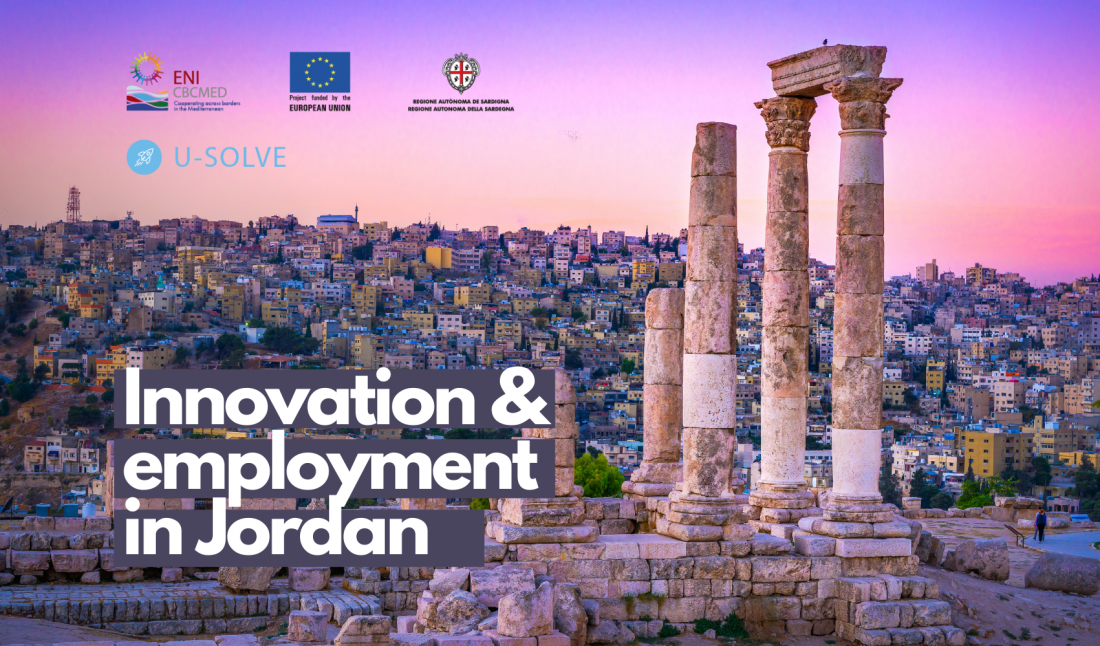U-SOLVE: The Higher Council for Science and Technology will reinforce the innovation-employability nexus in Jordan

Even though there are substantial differences in political, social, and economic conditions across the Mediterranean region, it is safe to say that with 25% youth unemployment (World Bank indicated that 50% in Jordan), the un- and underemployment of university graduates in Jordan has been a major challenge. In Jordan, where 50% of the population is under the age of 25, youth unemployment has been among the highest in the world for more than two decades. One reason for this is the skills mismatch, according to 32% of enterprises. And, unlike in other regions, unemployment is highest amongst those with tertiary education (as opposed to those without) reaching an average of 30% across the region (Mediterranean level). Moreover, there is a strong gender dimension. While young women have made remarkable progress in educational attainment, their respective unemployment rates are almost double those of young men.
In fact, the youth un- and underemployment in the region have all the characteristics of a so-called ‘wicked problem’ – it is socially complex, suffers from many interdependencies and multiple causes, has no single solution, and is perceived differently by different stakeholders. Wicked problems can be best tackled by taking a collaborative approach, engaging all stakeholders to create a common vision and narrative, and develop innovative strategies. In this context, the Triple Helix of Innovation offers an optimal framework for strengthening collaborative relationships between academia, industry, and government by co-creating a connective tissue, or Triple Helix, that intertwines common interests, values, strategies, investments, and narratives. The three spheres become a new motor of innovation and thus, employability.
The efforts to address the youth unemployment challenge in the Mediterranean have been considerable. There is a wide variety of initiatives and best practices involving academia, policymakers, industry, and the third sector at the macro, meso, and micro levels. However, the numerous initiatives and activities to date have not been able to produce the desired positive impact. That is why it is important to look forward to benefiting from any other opportunities (i.e; supported projects, partnerships, international cooperation, etc…) to address the challenge by collaborating across the different sectors and going beyond the single course of action.
In the quest for increased connectivity between academia, industry, and government to power innovation and employability, higher education institutions and research centers are seen as key drivers of change, ideally suited to ‘connect the dots’ because they are impartial, and driven by curiosity and long-term perspectives. To deliver on these expectations, universities and research institutes have to be highly responsive, adaptable, strategically directed, autonomously governed, and densely interlinked with regional partners as well as international networks. It is therefore key to reflect on how to support the best and through which tools. Industry can contribute through collaborative research, offering internship opportunities, and participating in curriculum development. However, policymakers also have an important role to play in improving the regulatory environment and creating incentives for both academia and industry to facilitate collaborative processes, on the supply side through producing employable graduates and on the demand side, through innovations and start-ups, which are a way to create new jobs.
In line with these issues, U-SOLVE aims to bring new job opportunities to the Mediterranean territories developing a Mediterranean model of urban development based on new businesses creation and technology transfer to SMEs to respond to the challenges of unemployment and connect it with innovation.
There will be a training program through U-SOLVE for women and young people in entrepreneurship, which will empower them and raise their entrepreneurial opportunities.
As a partner in U-SOLVE, HCST will provide all facilities to allow young people and women to transfer utilize their skills and transfer ideas into something real, and help them to secure and sustain a business.









